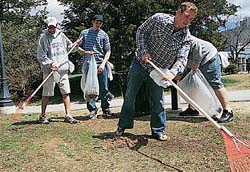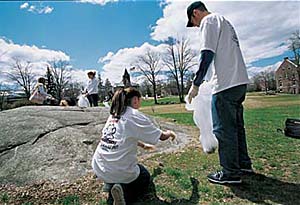 |
 |
| current issue |  |
past issues |  |
send a letter/news |  |
address update |  |
advertise |  |
about us |  |
alumni home |
Short Features
Business as UnusualHelping to run a nonprofit takes a different set of skills
by Shannon Goff '03
It's the last night of spring break, and freshman Jake Alibrandi is hard at work--on the basketball court. Clad in baggy red shorts and sneakers, he is on his feet, pacing, gesturing and shouting. It's clear he takes his role seriously, but he's not playing. He's the coach.
 Rakish help: UNH students from the Community Service and Leadership program participate in the campus-wide clean up on Ben Thompson's birthday in April. Photo by George Barker |
Alibrandi landed an internship as a volunteer high school basketball coach through the Thompson School's Community Service and Leadership program. Which explains why he's working, instead of squeezing another few hours of relaxation out of his spring break.
"I like coaching because I get results," says Alibrandi. "I can see if I'm actually helping someone by the way they improve or try harder. I don't need money or trophies. Just the fact that kids ask me for help or ask me what they are doing wrong, and knowing I can fix it--that's good enough for me."
This attitude is precisely the idea behind the Community Service and Leadership program: combine classroom learning with service projects that provide students with tangible skills. The two-year associate's degree program also includes courses in communication, fund raising, grant-writing, budgeting for nonprofits, organizing and supervising volunteers, and managing change and conflict. But it is the internships that provide a laboratory for learning, where students are transformed into effective leaders with a commitment to serving.
The program is unique in the region, maybe the country, according to director Kate Hanson, who helped launch it in 2001. "Three years ago, there was nobody here, and now we have so much going on," she says. "I'm amazed at what's happened." Along with traditional undergraduates, the program has attracted nontraditional students--community members and those already employed in nonprofit organizations who are seeking to expand their expertise. Hanson finds herself in awe of the energy and commitment of her students, which include 23 degree candidates and about 20 part-time students.
"This program is exactly what I wanted," say Alibrandi, who hopes to build a career out of his love for sports and community service. A volunteer coach since high school, he dreams of running a community athletic center for kids. Like many, Alibrandi was drawn by the program's commitment to hands-on learning and the chance to earn credit through internships. He takes what he learns in the classroom about communicating right out onto the basketball court. "Everyone is different, and you have to be open to other people's opinions," he says. "Sometimes the kids see things I don't, and they teach me something that helps me in the future. You learn a lot through volunteering."
Sometimes the learning in the CSL program comes in the most unexpected ways--a box of used coats, for example. Jessica Roy was one of the students who helped to organize a campus-wide coat drive among last year's incoming freshmen. The class was responsible for the entire undertaking--from setting up collection bins and promoting the event to counting, sorting and delivering the coats. "Although it was a lot of work, I had a great time," says Roy. "I find it better to learn in this kind of environment, rather than being lectured to for two hours."

|
For Julie-Ann Edwards '97, '03, the program was a chance to bring new skills to her current job at Measured Progress, a nonprofit testing company in Dover, N.H. "I learn by doing and seeing," Edwards says, noting that her service projects included skills directly applicable to her job: organizing committee meetings, writing analysis reports, facilitating discussion groups and managing conflicts. Edwards, who also holds a bachelor's degree in Russian from UNH, says the CSL program has helped her to be a more effective employee.
She has even considered starting her own nonprofit organization, confident that she now has the skills to do it. "The CSL program helped me, in very practical terms, learn to develop a vision into a plan of action," says Edwards, who was among the first graduates of the program in 2003. "I have the tools to develop a mission, recruit a board and volunteers, write a grant, build a fund raising database, cope with resistance from the community, network for support, and analyze the work being done and ways to improve it--all thanks to the CSL program."
During the skill and organizational development, students are sometimes touched in deeper ways. For some, like Ben Briggs '05, the program provides a spark, a way to take action in the face of tragedy.
Briggs had noticed a harrowing story in the paper about a young father, Gregory Shephard Jr., who had rescued his daughter, Maria, from his burning home and then plunged back inside to save his two small sons. All three died in the fire. His wife, severely burned, remained hospitalized. She faced huge medical bills with no medical insurance, and with Maria, the daunting task of rebuilding their lives.
Briggs didn't know the Dalton, N.H., family, but their plight galvanized him. He brought the story to a committee of fellow CSL students who were organizing a fund raiser. A wiffle ball tournament, with a $100 team-entry fee, was held April 25. "I learned a lot," says Briggs, who admits it was a big effort: hours of recruiting of volunteers, organizing schedules and making last-minute phone calls. But in a Ben Thompson Day ceremony, Briggs was able to present a check for $1,425--a small gesture in the face of tragedy, but tangible proof that someone cares. ~
Easy to print version
blog comments powered by Disqus

